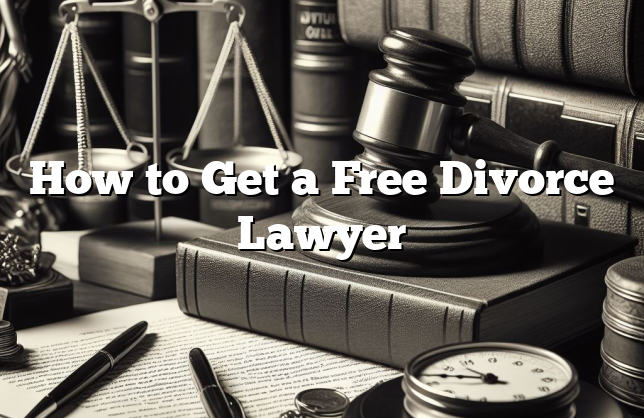Divorce proceedings can be emotionally and financially draining, especially when the burden of legal fees adds to an already stressful situation. However, access to legal representation is crucial in navigating the complexities of divorce proceedings and ensuring a fair outcome. For individuals facing financial constraints, the prospect of hiring a divorce lawyer may seem daunting. Fortunately, there are avenues available for obtaining free legal assistance to alleviate some of the financial burden associated with divorce.
Understanding Free Legal Aid
Free legal aid refers to the provision of legal services to individuals who cannot afford to hire a lawyer. These services are typically offered by government-funded programs, non-profit organizations, and pro bono initiatives. Free legal aid covers a wide range of legal issues, including divorce and family law matters.
To qualify for free legal aid, individuals must meet certain eligibility criteria, which often include income thresholds and specific requirements related to the nature of the legal issue. These criteria may vary depending on the organization or program providing the services.
Resources for Finding Free Divorce Lawyers
There are several resources available for individuals seeking free legal assistance with divorce proceedings. Government-funded legal aid programs operate at both the federal and state levels, providing subsidized legal services to low-income individuals. Additionally, non-profit organizations dedicated to serving underserved communities often offer free legal clinics and representation to those in need.
Pro bono services provided by law firms and individual lawyers are another valuable resource for individuals seeking free legal assistance. Many lawyers and law firms dedicate a portion of their time to providing pro bono representation to clients who cannot afford to pay for legal services.
Qualifying for Free Legal Assistance
To qualify for free legal assistance, individuals must meet the financial eligibility requirements set forth by the organization or program providing the services. This may involve providing documentation of income, assets, and expenses to demonstrate financial need. Additionally, individuals may need to meet specific criteria related to the nature of their legal issue, such as residency or citizenship requirements.
Steps to Apply for Free Legal Assistance
The process of applying for free legal assistance typically involves several steps. First, individuals should research available resources in their area to identify potential sources of free legal aid. Once identified, individuals should contact the relevant organizations to inquire about eligibility requirements and the application process.
Gathering necessary documents, such as proof of income and identification, is an essential step in the application process. Completing the application accurately and thoroughly is crucial to ensure timely consideration for free legal assistance.
Benefits of Free Divorce Lawyers
Access to free divorce lawyers offers numerous benefits to individuals facing financial hardship. Firstly, it provides access to experienced legal professionals who can offer guidance and representation throughout the divorce process. Additionally, free legal aid reduces the financial burden on individuals, allowing them to focus on navigating the emotional challenges of divorce without the added stress of exorbitant legal fees.
Challenges of Obtaining Free Legal Aid
While free legal aid can be a valuable resource for individuals in need, there are challenges associated with obtaining these services. Limited availability of free legal clinics and pro bono representation may result in long wait times for individuals seeking assistance. Additionally, stringent eligibility criteria may exclude some individuals from accessing free legal services.
Alternatives to Free Legal Aid
For individuals who do not qualify for free legal aid or are unable to access these services, there are alternatives available. Self-representation in divorce proceedings, although challenging, is an option for individuals with limited financial resources. Additionally, mediation and alternative dispute resolution methods offer a cost-effective way to resolve divorce-related issues outside of the courtroom.
Tips for Maximizing Free Legal Services
For those who are able to obtain free legal assistance, there are several tips for maximizing the benefits of these services. Effective communication with your lawyer is key to ensuring that your needs and concerns are adequately addressed throughout the legal process. Being prepared for court appearances and following legal advice diligently can help streamline the divorce proceedings and achieve a favorable outcome.
Conclusion
In conclusion, obtaining free legal assistance is a viable option for individuals facing financial constraints during divorce proceedings. By leveraging available resources and understanding the eligibility criteria, individuals can access experienced legal representation without the burden of high legal fees. While challenges may exist in obtaining free legal aid, the benefits of accessing these services far outweigh the obstacles.
FAQs
- Who is eligible for free legal aid in divorce cases?
- Eligibility for free legal aid varies depending on income thresholds and specific criteria set forth by the organization or program providing the services.
- What documents are needed to apply for free legal assistance?
- Applicants may need to provide proof of income, identification, and documentation related to the nature of their legal issue.
- Are there alternatives to free legal aid for divorce cases?
- Yes, alternatives to free legal aid include self-representation, mediation, and limited scope representation.
- How can individuals maximize the benefits of free legal services?
- Effective communication with your lawyer and diligent adherence to legal advice can help maximize the benefits of free legal services.
- What should individuals do if they do not qualify for free legal aid?
- Individuals who do not qualify for free legal aid can explore alternatives such as self-representation or mediation, or seek affordable legal assistance through other means.


